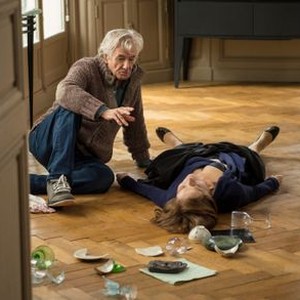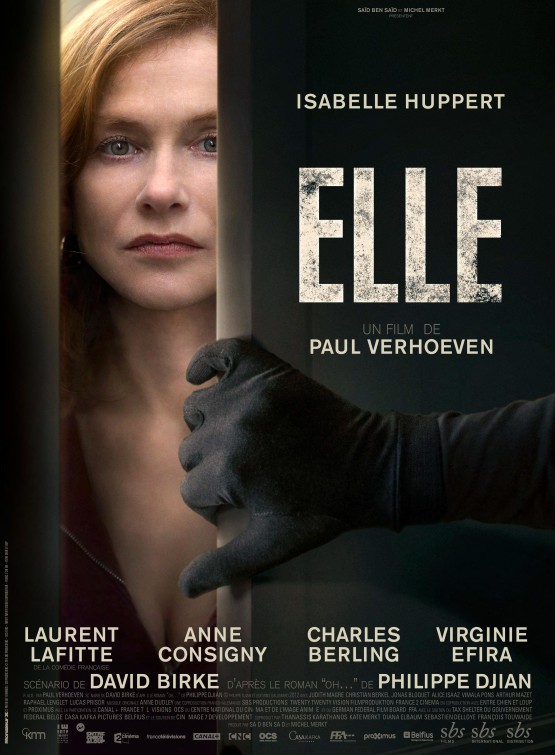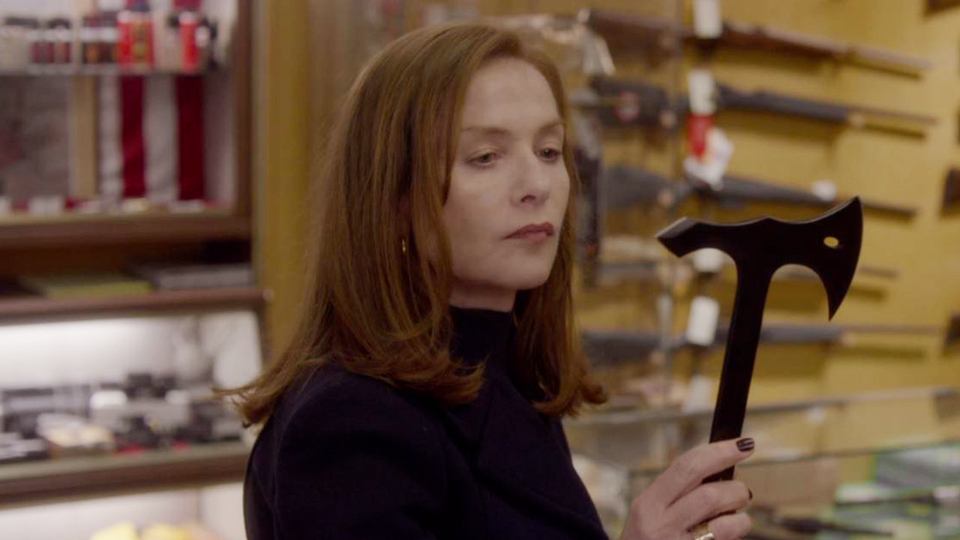
[caption id="attachment_57355" align="alignnone" width="300"] Paul Verhoeven directs Isabelle Huppert in "Elle."[/caption]
Paul Verhoeven directs Isabelle Huppert in "Elle."[/caption]
By Danny Peary
Elle fits my category "Movies That Should Play in Sag Harbor." For now you can see Paul Verhoeven’s intriguingly bizarre thriller/character study at the Lincoln Plaza and Angelika in New York City. Verhoeven, who made several marvelous films in his native Holland (Turkish Delight, Keetje Tippel, The 4th Man), before making Hollywood blockblusters that appealed to cultists and critics as well as the masses (RoboCop, Total Recall, Basic Instinct, the deliciously supercampy Showgirls, Starship Troopers), went to France for the first time to film this adaptation of Philippe Djian’s novel with the remarkable Isabelle Huppert.

With a history of twisted characters in her past when working with Claude Chabrol, Michael Haneke and others, Huppert was a brilliant choice to play Michèle, the seemingly indestructible and unfeeling CEO of a successful Video Company. In in the first scene, she is victim of a brutal rape by a masked man. But her reaction is quite odd. Too cool, too detached. Although she is determined to unmask the culprit, she almost shrugs off what has happened to her. Perhaps it is because as a young girl she was witness to her imprisoned father’s mass murder of children and since then has never felt emotion. As the synopsis says: “When she resolutely tracks the man down, they are both drawn into a curious and thrilling game—a game that may, at any moment, spiral out of control.” Take a look at the trailer: https://www.google.com/#q=elle+movie+trailer Huppert was recently in New York to promote Elle and Things to Come, and I was excited to have the opportunity to do this brief interview about Verhoeven’s film with one of my favorite actresses of all-time.
Danny Peary: This is a quote by you about your character in The Lacemaker: “No one could believe she was capable of strong feelings because she was so smooth, passive on the outside. In the theatre you can show it; in a movie you can go deeper and deeper inside with a camera. I think she is a very cinematic character.” That’s what you said about Pomme, but what about Michèle in Elle? You can go deep with the camera but I think you still will not completely see her.
[caption id="attachment_57354" align="alignright" width="300"] Isabelle Huppert in "Elle."[/caption]
Isabelle Huppert in "Elle."[/caption]
Isabelle Huppert: Yes, it could be. Maybe because she doesn’t see herself either, I don’t know. You don’t see her but at the same time you do see her—it’s very strange. I think the movie at the end leaves you thinking she got somewhere, you feel that she, obviously, wanted to experiment something, maybe to give a certain sense to her life, but you still don’t know
DP: In the press notes, Paul Verhoeven says how ambiguous you both thought the character is, and how you liked that about her. But do you think you knew her?
IH: No, I didn’t need to know her to play her. In fact I thought I shouldn’t know her. Each day when I came to the set I didn’t know exactly what I was going to do or knew while I was doing it. This gave us the feeling of surprise all the time. Nothing was predictable. She doesn’t know one moment what she’s going to do the next moment. Paul and I were talking this morning about how if we had sat down before the filming started and tried to establish exactly who she is—is she mad or not mad?; is she perverted or not perverted?—then we would have stopped doing the film right away. I think the film is interesting because we didn’t answer the questioning and it’s constantly open for interpretation. We had literally burning material but if we answered those questions before filming we would have set the fire at the beginning, rather than adding fuel to the fire as we were doing the film until it becomes an explosion.
DP: So, from what you just said about Michèle being unpredictable even to you--until you actually shot scenes--do you know more about her from having watched the film than when you played her?
IH: Oh, yes, a little bit more. Because now everything has been put together. Let’s put it this way…. I was sure she wasn’t a weak person. I like that she doesn’t have any emotional reaction. Or, let me say, the minimal amount. Sometimes she does, but it’s interesting for someone who watches the film closely to know that the only times she bears even a small emotional reaction and seems troubled for even a moment have to do with her parents. Maybe she never really grew up.
DP: That makes sense because of the picture we see of Michele as a little girl, standing still, eyes wide, without expression, while covered in blood after her father’s rampage. She can’t recover from that.
IH: She’s frozen from that moment. She of course added multiple layers to the social definition of herself. She now powerful, she’s the CEO of her company, and so many people are dependent on her. Yet something inside her might have been untouched since that moment when she was witnessing her father committing the murders. Now that I talk to you that’s what I’m thinking, but each time I talk to someone I come up with new explanations and interpretations. The movie is by no means the emotional or psychological study of a character, so I knew I didn’t want this woman to be in tears—you notice that she never cries.
DP: She never feels physical or psychological pain. Does she feel remorse, fear, guilt? Is she ever embarrassed? Is she ever insecure?
IH: She doesn’t show it. But the miracle is that at the end you still have someone who is touching.
DP: She does feel jealousy. She is jealous of her ex-husband having a young lover.
IH: Yes, she is jealous and she can be very cruel because of that.
DP: You and I both saw Turkish Delight decades ago and it made a huge impression on both of us.
IH: That’s right, I love that film. Monique de Ven is wonderful in it.
DP: At the time I had never heard of Paul Verhoeven but after I saw the movie I had to read the book. The unpredictability of the female is what stood out, and her character was a little off because something was wrong with her and that made her exciting. I can see why that character would appeal to you so much that, as you’ve said, it influenced you to become an actress and has influenced your choice of characters over the years.
IH: Exactly. I love that character. You find out the reason she was so unpredictable and unmanageable is because she’s dying from a brain tumor. The two movies are completely different, but here again I love the way Paul shows this woman who is apparently very strong and is unwilling to be the classical victim, yet you’re left with the impression that she may not be that strong and may still be the little girl she was.
DP: In your Claude Chabrol films and other films as well, you seem to be drawn to playing women who startle us, who jolt us, with their actions, but who never seem to be jolted themselves by murders or anything else. I think of your character stabbing herself in Michael Haneke’s The Piano Teacher. We’re jolted, she isn’t. Nothing, she just does it matter-of-factly. Is that how you see it?
IH: I think so. It’s closer to what it is in real life. Most visible reactions are more fictional than real. I think what Paul and I were seeking in this film, without even telling each other—because he never directed me or said a word to me in twelve weeks of filming—was something very true. We had a mutual understanding. Sometimes in fiction, in movies, we are making up visible reactions to make it understandable by the public but it’s far from what would happen in reality. My one obsession as an actress is to make things as believable as possible.
DP: You are such an interesting actress to me because we see different things in your face but you also have that impassive thing going on. We wonder if what Michèle and other characters are thinking is different from how they are acting.
IH: That makes sense. Again it’s about being as real as possible. If I indicate too much I feel I’m betraying reality. Most of the time in life when things happen, you do react but it’s only inside. The camera allows you to react and not react at the same time—nonreact in the sense that you don’t overdo it but you still express thoughts.
DP: In the movie, Michele uses binoculars and watches her handsome neighbor across the street and masturbates. Is she excited just by his looks or does she detect that they have a twisted bond?
IH: No, she doesn’t detect anything. I never discussed it with Paul but at that point I don’t think she has any suspicions about him. She’s just attracted to him. Plus there’s a religious thing. We see her doing it and it’s kind of funny because he lives just across the street and he’s setting up everything with his wife for Christmas time. Paul likes to make things disturbing but funny at the same time. Also I think the distance aspect is really interesting in terms of metaphor. She does this sexual activity and uses the binoculars…
DP: In movies it’s usually men who use binoculars to spy on women.
IH: Yes, but it’s not that. I don’t know how to explain it, but the fact that she’s far and close at the same time is maybe revealing how she views relationships with men and with people in general. This also expresses what cinema is about. It’s voyeurism in which you are far and close at the same time. So I think this is good cinema, what cinema truly means.
DP: When you were filming the rape scene and the brutal boiler room sexual encounter were there any sounds on the set? Did Paul play music, as there is in the boiler room scene on the soundtrack?
IH: No, that music was added later, and there was no specific noise on the set except for the shouts. I’m glad you mentioned music. It’s so subtle so I hope people noticed, but did you hear the classical music at the beginning?
DP: Yes, and in the boiler room scene. To me, it was a bit like how Chabrol would use it, mixing elegance with perverse activities.
IH: It was very moving in a way, and really created weird atmosphere. I think that it’s not hard rock music, but is instead classical music, with its delicateness, gives an emotion to it—a softness that contradicts what was just before, the violence of the rape.
DP: You have played much more meaner and vicious women, including the real-life title character in Chabrol’s Violette. Did you want to like Michèle? Did you automatically like her or did you tell yourself to like her or not like her?
IH: It’s not something I would tell myself to do, it should be completely instinctive. You don’t even have to understand her. With the help of the mise-en-scène of the director, there was an attempt to establish in her, the veracity, humanity, and, I would say, a small amount of innocence. You know that Violette Noziere, for example, was a murderer. She killed her father [and was convicted in 1933], yet she was pardoned by General De Gaulle in 1963—can you imagine?--and married the son of the director of the prison where was sent and they had five children. And she was highly praised by poets like Paul Eluard, who said “she undid perverse knots of family ties.” I don’t know but the part of innocence must operate somewhere.
DP: Well, did you like her?
IH: Hmm….As a character. Just like Michèle.
*****
DP: I want to remind everyone to go to Doc NYC and see The Guys Next Door this Sunday at noon at the SVA Theater on 23rd Street between 8th and 9th Avenues. Please view the trailer: https://vimeo.com/121082340 My interview with the directors, Amy Geller and Allie Humenuk was posted here last weekend: https://sagharborexp.wpengine.com/geller-humenuk-introduce-guys-next-door-sunday-doc-nyc/
This Friday, Veterans Day, a terrific documentary about our drone program, “National Bird” opens at the Cinema Village (12th Street off University) in New York City. Please watch the trailer now: https://www.google.com/#q=national+bird+trailer and be sure to look out for my lengthy interview here this weekend with the director, Sonia Kennebeck.